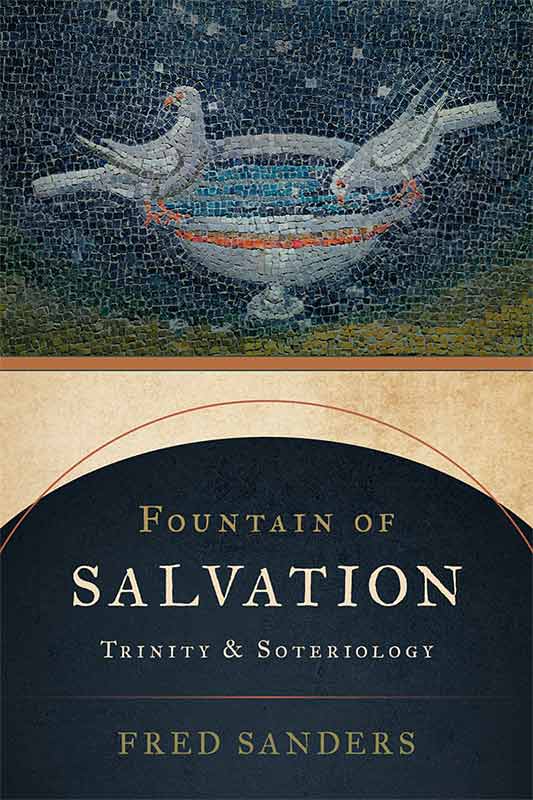A scene from the Leben der heiligen Altväter (1482)
Fountain of Salvation
Trinity and Soteriology
The relation of God and salvation is not primarily a problem to be solved. Rather, it is the blazing core of Christian doctrine, where the triune nature of God and the truth of the gospel come together.
Accordingly, a healthy Christian theology must confess the doctrine of the Trinity and the doctrine of salvation as closely related, mutually illuminating, and strictly ordered. When the two doctrines are left unconnected, both suffer. The doctrine of the Trinity begins to seem altogether irrelevant to salvation history and Christian experience, while soteriology meanwhile becomes naturalized, losing its transcendent reference. If they are connected too tightly, on the other hand, human salvation seems inherent to the divine reality itself. Deftly navigating this tension, Fountain of Salvation relates them by expounding the doctrine of eternal processions and temporal missions, ultimately showing how they inherently belong together.
The theological vision expounded here by Fred Sanders is one in which the holy Trinity is the source of salvation in a direct and personal way, as the Father sends the Son and the Holy Spirit to enact an economy of revelation and redemption. Individual chapters show how this vision informs the doctrines of atonement, ecclesiology, Christology, and pneumatology—all while directly engaging with major modern interpreters of the doctrine of the Trinity. As Sanders affirms throughout this in-depth theological treatise, the triune God is the fountain from which all other doctrine flows—and no understanding of salvation is complete that does not begin there.
Eerdmans (September 2, 2021)
Paperback, 248 pages
ISBN-10: 0802878105 / ISBN-13: 978-0802878106
Available at any of the following.

“Professor Sanders is one of the most sophisticated and historically sensitive contemporary theologians. In this volume he brings his considerable acumen to bear on the relation between the doctrine of the Trinity and the scope and content of salvation. The result is a tour de force that demonstrates the fecundity of trinitarian theology for the church and the Christian life. An impressive achievement.”
University of St. Andrews

“To paraphrase Kant: the Trinity without salvation is empty, an intimidating abstraction; salvation without the Trinity is blind, an inexpressible experience. Sanders here strikes the perfect balance between the triune God of the gospel and the gospel of the triune God, offering a compelling argument for both their proper distinction and their proper relation. Thanks to this Fountain of Salvation, my cup of theology runneth over. I can’t wait to assign this refreshing cup of cold water to my students.”
Trinity Evangelical Divinity School

“In Fountain of Salvation, Fred Sanders offers a wonderful introduction to the Trinity as the object of Christian worship and as a belief inseparable from and indeed structuring the doctrine of salvation. He then leads us clearly, interestingly, and dependably through recent theological debates on this fundamental Christian belief, always showing us where (and where not) those debates really do enable Christians to grow in knowledge of the Triune life. Across Christian traditions Sanders’s argument should resonate and inspire.”
Durham University

“In Fountain of Salvation, Fred Sanders continues, interrogates, and extends the modern program of reflecting on the being of the triune God in light of the history of salvation. Ever on guard against reducing the being of God to his works, Sanders analyzes topics as diverse as atonement, church, Christian life, and theological education through the bifocal lens of Trinity and salvation. The result is a work of subtle judgment and profound insight, exactly what one would expect from our most gifted theologian of the Trinity.”
Reformed Theological Seminary, Orlando

“In this characteristically insightful work, Fred Sanders illumines the deep and inextricable connections between the doctrine of the Trinity and the doctrine of salvation. Treading a difficult path through the theological temptations and perils on either side, he sets out a sound programmatic agenda for constructive Trinitarian thinking today. Deeply rooted in Scripture and widely informed by tradition, this volume is a welcome and salutary addition to the shelves of both theologians and pastors.”
University of Aberdeen
 Fred Sanders
Fred Sanders






